Submitted:
29 March 2023
Posted:
03 April 2023
You are already at the latest version
Abstract
Keywords:
Introduction
Methods and Materials
Participants
Measures
Autonomic measures
Questionnaires
Procedures
Statistical analysis
Results
Clinical characteristics of the subjects
EIG vs. non - EIG
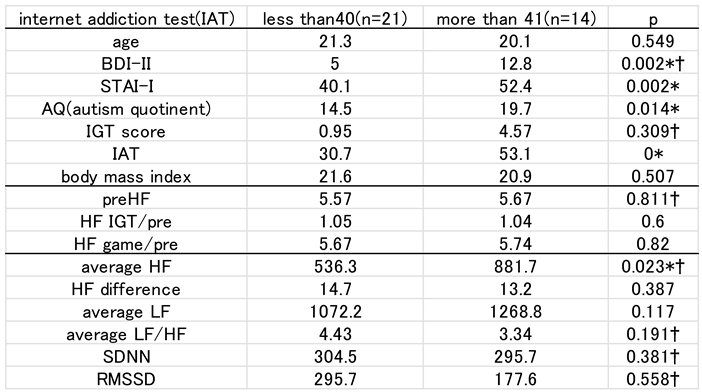 |
Effects of EIG and age on IGT scores
Discussion
Supplementary Materials
Author Contributions
Funding
Institutional Review Board Statement
Informed Consent Statement
Data Availability Statement
Conflicts of Interest
References
- Benjamin BR, Valstad M, Elvsåshagen T, Jönsson EG, Moberget T, Winterton A, Haram M, Høegh MC, Lagerberg TV, Steen NE, Larsen L, Andreassen OA, Westlye LT, Quintana DS. Heart rate variability is associated with disease severity in psychosis spectrum disorders. Progress in neuro-psychopharmacology & biological psychiatry, 2021, 111, 110108. https://doi.org/10.1016/j.pnpbp.2020.110108. [CrossRef]
- Chiu HT, Ip IN, Ching FNY, Wong BP, Lui WH, Tse CS, Wong SWH. Resting Heart Rate Variability and Emotion Dysregulation in Adolescents with Autism Spectrum Disorder. J Autism Dev Disord. 202310.1007/s10803-022-05847-x. Advance online publication. https://doi.org/10.1007/s10803-022-05847-x. [CrossRef]
- Lin, P. C., Kuo, S. Y., Lee, P. H., Sheen, T. C., & Chen, S. R. Effects of internet addiction on heart rate variability in school-aged children. Journal of Cardiovascular Nursing. 2014; 29: 493-498. https://doi.org/10.1097/JCN.0b013e3182a477d5. [CrossRef]
- Chang, J. S., Kim, E. Y., Jung, D., et al. Altered cardiorespiratory coupling in young male adults with excessive online gaming. Biological Psychology. 2015; 110; 159-166. https://doi.org/10.1016/j.biopsycho.2015.07.016. [CrossRef]
- Hsieh, D. L., Hsiao, T. C. Respiratory sinus arrhythmia reactivity of internet addiction abusers in negative and positive emotional states using film clips stimulation. BioMedical Engineering Online. 2016 15(1), 69. https://doi.org/10.1186/s12938-016-0201-2. [CrossRef]
- Kim, N., Hughes, T. L., Park, C. G., Quinn, L., Kong, I. D.. Altered Autonomic Functions and Distressed Personality Traits in Male Adolescents with Internet Gaming Addiction. Cyberpsychology, Behavior, and Social Networking. 2016; 19: 667-673. https://doi.org/10.1089/cyber.2016.0282. [CrossRef]
- Hong, S. J., Lee, D., Park, J., et al. Altered heart rate variability during gameplay in internet gaming disorder: The impact of situations during the game. Frontiers in Psychiatry. 2018 9, 429. https://doi.org/10.3389/fpsyt.2018.00429. [CrossRef]
- Moretta, T., Buodo, G. Autonomic stress reactivity and craving in individuals with problematic Internet use. PLoS ONE. 2018 13(1), e0190951. https://doi.org/10.1371/journal.pone.0190951. [CrossRef]
- Lee D, Hong SJ, Jung YC, Park J, Kim IY, Namkoong K. Altered Heart Rate Variability During Gaming in Internet Gaming Disorder. Cyberpsychol Behav Soc Netw. 2018 Apr;21(4):259-267. https://doi.org/10.1089/cyber.2017.0486. [CrossRef]
- Task Force of the European Society of Cardiology and the North American Society of Pacing and Electrophysiology. Heart rate variability. Standards of measurement, physiological interpretation, and clinical use. Eur Heart J 1996, 17(3): 354-381.
- Widjaja, D., A. Caicedo, E. Vlemincx, I. Van Diest, S. Van Huffel . Separation of respiratory influences from the tachogram: a methodological evaluation. PLoS One, 2014 9(7): e101713. https://doi.org/10.1371/journal.pone.0101713. [CrossRef]
- Berntson, G. G., Bigger, J. T., Eckberg, D. L., et al. HRV_Orgins, methods, and interpretive caveats. Psychophysiology. 1997; 34: 623-648. https://doi.org/10.1111/j.1469-8986.1997.tb02140.x. [CrossRef]
- Martelli D, Silvani A, McAllen RM, May CN, Ramchandra R. The low frequency power of heart rate variability is neither a measure of cardiac sympathetic tone nor of baroreflex sensitivity. Am J Physiol Heart Circ Physiol. 2014 Oct 1;307(7):H1005-12. https://doi.org/10.1152/ajpheart.00361.2014. [CrossRef]
- Abellán-Aynés, O., Naranjo-Orellana, J., Manonelles, P., & Alacid, F. MULTISCALE ENTROPY AND MULTISCALE TIME IRREVERSIBILITY ANALYSIS OF RR TIME SERIES DEPENDING ON AMBIENT TEMPERATURE. Journal of Mechanics in Medicine and Biology, 2020. 20, 2050029. https://doi.org/10.1142/S0219519420500293. [CrossRef]
- Quintana, D. S., Alvares, G. A., & Heathers, J. A. J. Guidelines for Reporting Articles on Psychiatry and Heart rate variability (GRAPH): recommendations to advance research communication. In Translational psychiatry. 2008; 43: 895-909.
- Laborde, S., Mosley, E., Thayer, J. F. Heart rate variability and cardiac vagal tone in psychophysiological research - Recommendations for experiment planning, data analysis, and data reporting. Frontiers in psychology, 8, 213. https://doi.org/10.3389/fpsyg.2017.00213. [CrossRef]
- Holzman, J. B., & Bridgett, D. J. Heart rate variability indices as bio-markers of top-down self-regulatory mechanisms: A meta-analytic review. Neuroscience and Biobehavioral Reviews. 2017; 74: 233-255. https://doi.org/10.1016/j.neubiorev.2016.12.032. [CrossRef]
- Porges, S. W. The polyvagal theory: phylogenetic substrates of a social nervous system Int. J. Psychophysiol. 2001; 42:123-146. https://doi.org/10.1016/S0167-8760(01)00162-3. [CrossRef]
- Porges, S. W. A phylogenetic journey through the vague and ambiguous Xth cranial nerve: a commentary on contemporary heart rate variability research. Biol Psychol 2007; 74(2): 301-307. https://doi.org/10.1016/j.biopsycho.2006.08.007. [CrossRef]
- Thayer, J. F. R. D. Lane. Claude Bernard and the heart-brain connection: further elaboration of a model of neurovisceral integration. Neurosci Biobehav Rev 2009; 33: 81-88. https://doi.org/10.1016/j.neubiorev.2008.08.004. [CrossRef]
- Bakken, I. J., Wenzel, H. G., Götestam, K. G., Johansson, A., Øren, Internet addiction among Norwegian adults: A stratified probability sample study. Scandinavian Journal of Psychology. 2009; 50:121-127. https://doi.org/10.1111/j.1467-9450.2008.00685.x. [CrossRef]
- Kuss, D. J., Van Rooij, A. J., Shorter, G. W., Griffiths, M. D., Van De Mheen, D. Internet addiction in adolescents: Prevalence and risk factors. Computers in Human Behavior. 2013; 29: 1987-1996. https://doi.org/10.1016/j.chb.2013.04.002. [CrossRef]
- Goffeng, E. M., Nordby, K. C., Tarvainen, M. P.,et al. Fluctuations in heart rate variability of health care workers during four consecutive extended work shifts and recovery during rest and sleep. Industrial Health. 2018; 56: 122-131. https://doi.org/10.2486/indhealth.2017-0100. [CrossRef]
- Borchini, R., Ferrario, M. M., Bertù, L., et al. Prolonged job strain reduces time-domain heart rate variability on both working and resting days among cardiovascular-susceptible nurses. International Journal of Occupational Medicine and Environmental Health. 2015; 28: 42-51. https://doi.org/10.2478/s13382-014-0289-1. [CrossRef]
- Huikuri, H. V., Niemelä, M. J., Ojala, S., Rantala, A., Ikäheimo, M. J., & Airaksinen, K. E. J. Circadian rhythms of frequency domain measures of heart rate variability in healthy subjects and patients with coronary artery disease: Effects of arousal and upright posture. Circulation. 1994; 90: 121-126. https://doi.org/10.1161/01.cir.90.1.121. [CrossRef]
- Bilan, A., Witczak, A., Palusiński, R., Myśliński, W., Hanzlik, J. Circadian rhythm of spectral indices of heart rate variability in healthy subjects. Journal of Electrocardiology. 2005; 38: 239-243. https://doi.org/10.1016/j.jelectrocard.2005.01.012. [CrossRef]
- Li, K., H. Rudiger, T. Ziemssen. Spectral Analysis of Heart Rate Variability: Time Window Matters. Front Neurol 2019; 10: 545. https://doi.org/10.3389/fneur.2019.00545. [CrossRef]
- Young KS. Caught in the Net: How to Recognize the Signs of Internet Addiction – and a Winning Strategy for Recovery. Wiley, New York.
- American Psychiatric Association. Diagnostic and statistical manual of mental disorders Text Revision (DSM-IV-TR) , American Psychiatric Association, Washington, D.C, 2000.
- Sawada Y, Ohtomo N, Tanaka Y, Tanaka G, Yamakoshi K, Terachi S, Shimamoto K, Nakagawa M, Satoh S, Kuroda S, Iimura O. New technique for time series analysis combining the maximum entropy method and non-linear least squares method: its value in heart rate variability analysis. Med Biol Eng Comput. 1997 Jul;35(4):318-22. https://doi.org/10.1007/BF02534083. [CrossRef]
- Shaffer F, Ginsberg JP. An Overview of Heart Rate Variability Metrics and Norms. Front Public Health. 2017 5, 258.https://doi.org/10.3389/fpubh.2017.00258. [CrossRef]
- Beck, A. T., Steer, R. A., Brown, G. K. Manual for the Beck depression inventory-II. San Antonio, TX: Psychological Corporation. 1996.
- Kojima, M., Furukawa, T. A., Takahashi, H., Kawai, M., Nagaya, T., Tokudome, S. Cross-cultural validation of the Beck Depression Inventory-II in Japan. Psychiatry Research. 2002; 31: 291-299. https://doi.org/10.1016/s0165-1781(02)00106-3. [CrossRef]
- Spielberger, C. D., Reheiser, E. C. Assessment of Emotions: Anxiety, Anger, Depression, and Curiosity. Applied Psychology: Health and Well-Being. 2009; 15: 271-302. https://doi.org/10.1111/j.1758-0854.2009.01017.x. [CrossRef]
- Nakazato K, Mizuguchi T. Development and validation of Japanese version of state-trait anxiety inventory: a study with female subjects. hinshin Igaku [in Japanese]. 1982;22(s):107–12.
- Wakabayashi A, Tojo Y, Baron-Cohen S, Wheelwright S. The autismSpectrum quotient (AQ) Japanese version: evidence from high-functioning clinical group and normal adults. Shinrigaku Kenkyu. 2004;75 : 8–84. https://doi.org/10.4992/jjpsy.75.78. [CrossRef]
- Woodbury-Smith, M. R., Robinson, J., Wheelwright, S., Baron-Cohen, S. Screening adults for Asperger Syndrome using the AQ: A preliminary study of its diagnostic validity in clinical practice. Journal of Autism and Developmental Disorders. 2005: 35; 331-335. https://doi.org/10.1007/s10803-005-3300-7. [CrossRef]
- Bechara A., Damasio A. R., Damasio H., Anderson S. W. Insensitivity to future consequences following damage to human prefrontal cortex. Cognition,1994; 50 : 7–15. https://doi.org/10.1016/0010-0277(94)90018-3. [CrossRef]
- Blood JD, Wu J, Chaplin TM, Hommer R, Vazquez L, Rutherford HJ, Mayes LC, Crowley MJ. The variable heart: High frequency and very low frequency correlates of depressive symptoms in children and adolescents. J Affect Disord. 2015 Nov 1;186:119-26. https://doi.org/10.1016/j.jad.2015.06.057. [CrossRef]
- Smirni D, Garufo E, Di Falco L, Lavanco G. The Playing Brain. The Impact of Video Games on Cognition and Behavior in Pediatric Age at the Time of Lockdown: A Systematic Review. Pediatr Rep. 2021 Jul 14;13(3):401-415. https://doi.org/10.3390/pediatric13030047. [CrossRef]
- Tateno, M., Teo, A. R., Shiraishi, M., Tayama, M., Kawanishi, C., Kato, T. A. Prevalence rate of Internet addiction among Japanese college students: Two cross-sectional studies and reconsideration of cut-off points of Young’s Internet Addiction Test in Japan. Psychiatry and Clinical Neurosciences. 2018; 72: 723-730. https://doi.org/10.1111/pcn.12686. [CrossRef]
- Fei, L., Copie, X., Malik, M., & Camm, A. J. Short- and long-term assessment of heart rate variability for risk stratification after acute myocardial infarction. The American journal of cardiology, 1996.77(9),681–684. https://doi.org/10.1016/s0002-9149(97)89199-0. [CrossRef]
- Bigger, J. T., Jr, Steinman, R. C., Rolnitzky, L. M., Fleiss, J. L., Albrecht, P., & Cohen, R. J. Power law behavior of RR-interval variability in healthy middle-aged persons, patients with recent acute myocardial infarction, and patients with heart transplants. Circulation, 1996 93(12), 2142–2151. https://doi.org/10.1161/01.cir.93.12.2142. [CrossRef]
- Kim H, Kim L, Im CH. Machine-Learning-Based Detection of Craving for Gaming Using Multimodal Physiological Signals: Validation of Test-Retest Reliability for Practical Use. Sensors (Basel). 2019 Aug 9;19(16):3475. https://doi.org/10.3390/s19163475. [CrossRef]
- Krivonogova O, Krivonogova E, Poskotinova L. Time Estimation or Autonomic Heart Rate Regulation: Which Mechanism Is More Sensitive in the Development of Internet Addiction in Adolescents? Int J Environ Res Public Health. 2022 Sep 22;19(19):11977. https://doi.org/10.3390/ijerph191911977. [CrossRef]
- Beitz KM, Salthouse TA, Davis HP. Performance on the Iowa Gambling Task: From 5 to 89 years of age. J Exp Psychol Gen. 2014 Aug;143(4):1677-1689. https://doi.org/10.1037/a0035823. [CrossRef]
- Forte G, Morelli M, Casagrande M. Heart Rate Variability and Decision-Making: Autonomic Responses in Making Decisions. Brain Sci. 2021 Feb 15;11(2):243. https://doi.org/10.3390/brainsci11020243. [CrossRef]
- Antelmi I, de Paula RS, Shinzato AR, Peres CA, Mansur AJ, Grupi CJ. Influence of age, gender, body mass index, and functional capacity on heart rate variability in a cohort of subjects without heart disease. Am J Cardiol. 2004 Feb 1;93(3):381-5. https://doi.org/10.1016/j.amjcard.2003.09.065. [CrossRef]
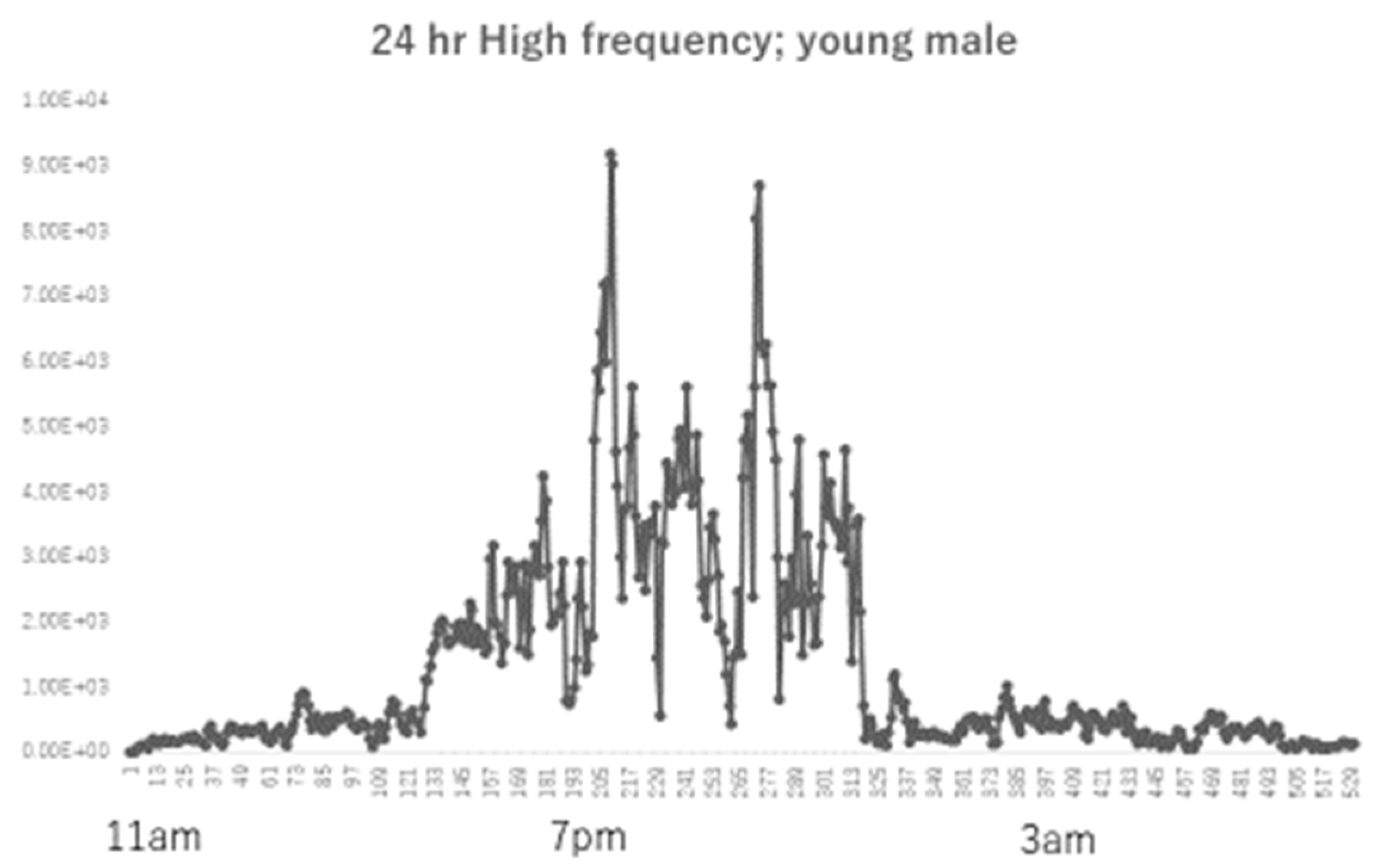
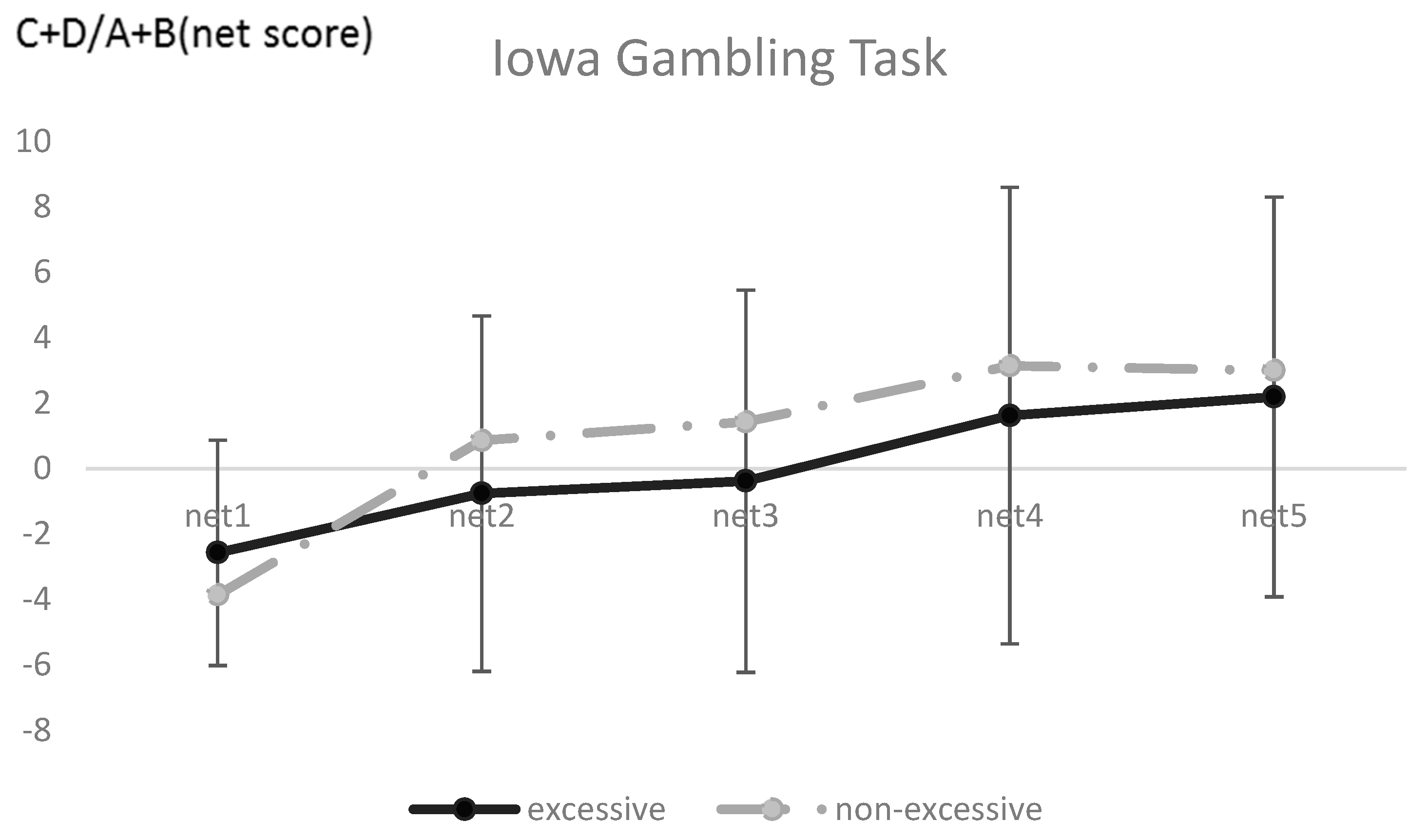
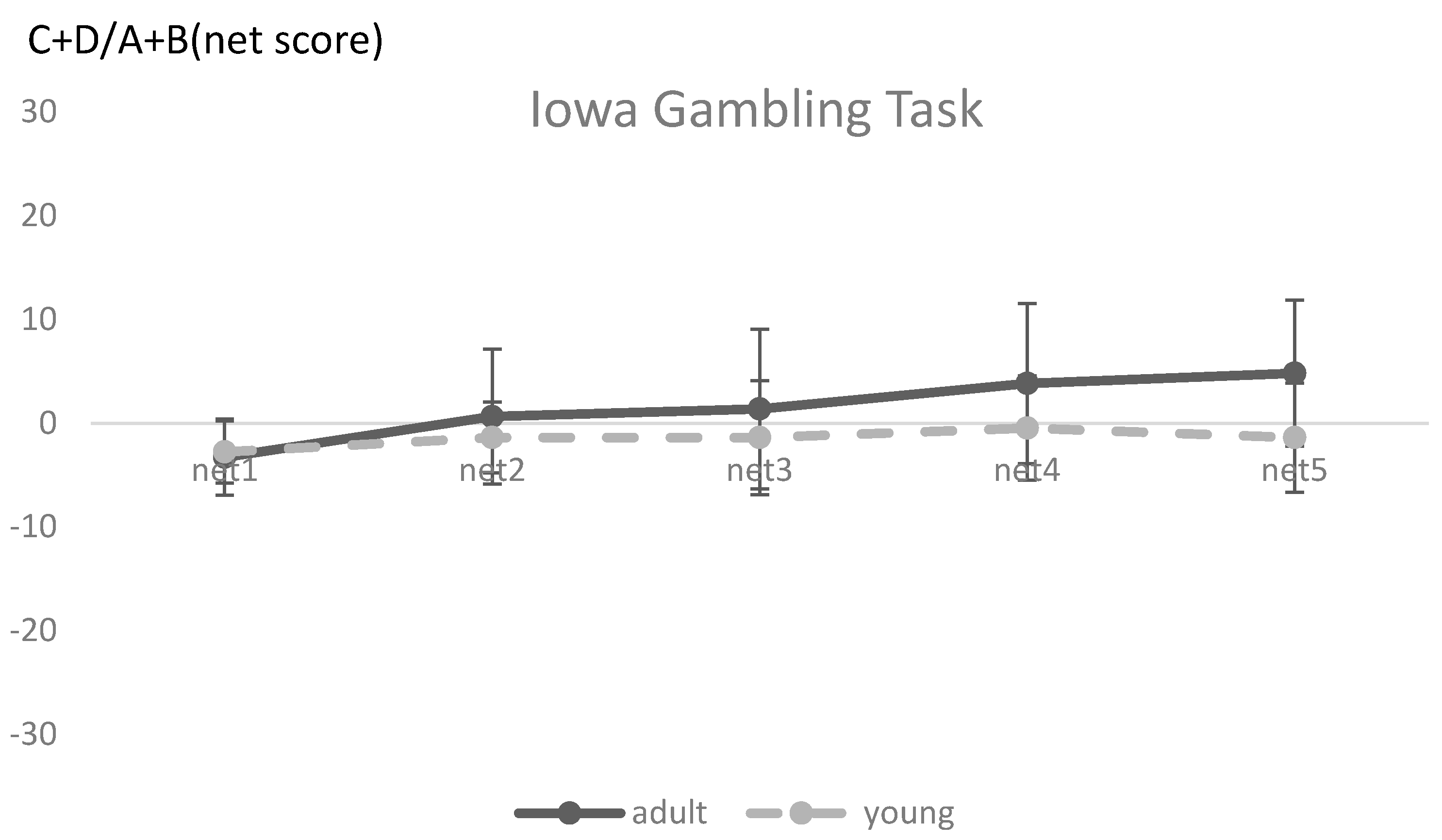
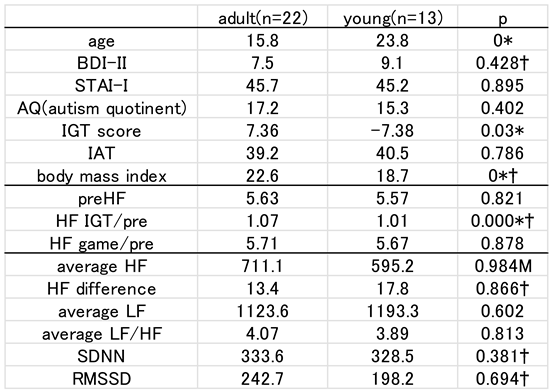 |
Disclaimer/Publisher’s Note: The statements, opinions and data contained in all publications are solely those of the individual author(s) and contributor(s) and not of MDPI and/or the editor(s). MDPI and/or the editor(s) disclaim responsibility for any injury to people or property resulting from any ideas, methods, instructions or products referred to in the content. |
© 2023 by the authors. Licensee MDPI, Basel, Switzerland. This article is an open access article distributed under the terms and conditions of the Creative Commons Attribution (CC BY) license (http://creativecommons.org/licenses/by/4.0/).




